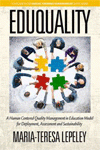
EDUQUALITY
Human Centered Quality Management in Education. A Model for Deployment, Assessment and Sustainability
By:
Maria-Teresa Lepeley, Global Institute for Quality Education USA
A volume in the series: Innovation in Human Centered Sustainability. Editor(s): Maria-Teresa Lepeley, Global Institute for Quality Education USA.
Published 2019
We, educators, are often so involved in daily teaching duties that lack time to absorb the broader picture of what is happening beyond our classrooms in a rapidly changing world. That is the norm in our profession. But our responsibility is to constantly improve the wellbeing of all the students enrolled in our classes. Education is the most important and most challenging profession there is. Educators shape future leaders, heroes, and people who can improve the world. Transformational educators have long term effects in the lives of students that projects on nations. On the opposite side, students waste time sitting in a classroom and can hamper future opportunities in life when educators fail to motivate them to assume responsibility for improving their wellbeing and build a better world for all.
Education is not just another profession, it is an extraordinary endeavor with surmounting human responsibility to transform lives for the better.
To claim the merit of education, educators must project education beyond school border into the context of society and the economy. To miss this context is a pending challenge. We, educators, need to earn the merit we deserve. But we now know that we earn merit with knowledge how to manage for quality and continuous improvement aiming at results leading to sustainability and working systematically to reach high standards.
Lepeley, author of numerous publications on the subject, former examiner of the US Baldrige National Quality Award and adviser to NQAs in six countries in Latin America, presented her quality management model for education in the World Bank Global Network in the early 2000’s. Her model has pioneered integration of education with other disciplines and other sectors projecting the importance and impact of education on sustainable development. The author emphasizes that neglecting the surmounting demand for quality will impair education as a fundamental factor of development, harm the worth of educators, undermine the profession and dent the wellbeing of human beings in inclusive nations and a peaceful world.
CONTENTS
Preface. About the Author. PART I CHAPTER 1: Introduction to Quality in Education. CHAPTER 2: Global Claims for Quality in Education. CHAPTER 3: Quality Standards for Education: Leading the Transformation. PART II CHAPTER 4: Human Centered Sustainable Quality Management in Education. CHAPTER 5: Management Area 1: Consumers of Education: Students, Workforce, Parents (190 points) CHAPTER 6: Management Area 2: Producers of Education: Educators, Ancillary Personnel, Institutions (180 points) CHAPTER 7: Management Area 3: Constructive Leadership (170 points) CHAPTER 8: Management Areas 4: Planning for Quality: Structures and Strategies (160 points) CHAPTER 9: Management Area 5: Technology and Knowledge Management (100 points) CHAPTER 10: Management Area 6: Quality Education Support Processes (100 points) CHAPTER 11: Management Area 7: Institutional Integration, Benchmarking, Environment Care (100 points) CHAPTER 12: Institutional Improvement Report IIR: The Quality GPS References.
MORE INFORMATION
SEE ALSO: EDUCONOMY by Maria-Teresa Lepeley
-
Paperback978-1-64113-486-6
Web price: $45.04 (Reg. 52.99)
-
Hardcover978-1-64113-487-3
Web price: $80.74 (Reg. 94.99)
- eBook978-1-64113-488-0

- EDU011000 - EDUCATION: Evaluation & Assessment
- EDU044000 - EDUCATION: Classroom Management
- EDU000000 - EDUCATION: General
-
 Distance Learning
Volume 20 #1
Distance Learning
Volume 20 #1
-
 Distance Learning
Volume 20 #3
Distance Learning
Volume 20 #3
-
 Distance Learning
Volume 20 #4
Distance Learning
Volume 20 #4
-
 EDUCONOMY
Unleashing Wellbeing and Human Centered Sustainable Development
EDUCONOMY
Unleashing Wellbeing and Human Centered Sustainable Development
-
 Promoting Equitable Classroom Practices in Higher Education
Approaches Beyond Curriculum
Promoting Equitable Classroom Practices in Higher Education
Approaches Beyond Curriculum
-
 Reflections on People, Policy, and Practices in Curriculum History
Reflections on People, Policy, and Practices in Curriculum History
-
 Rekindling Embers of the Soul
An Examination of Spirituality Issues Relating to Teacher Education
Rekindling Embers of the Soul
An Examination of Spirituality Issues Relating to Teacher Education

